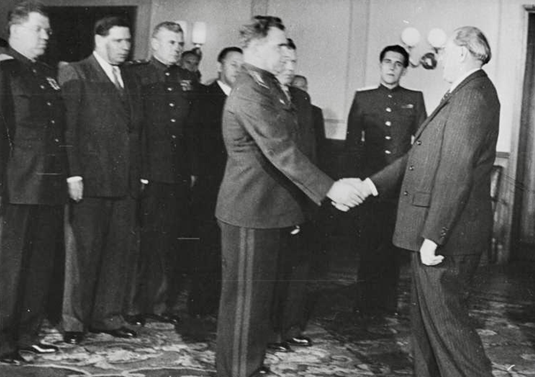Facing A Difficult Truth
- Sep 2, 2024
- 2 min read

Pictured: Image from D. A. Volkogonov’s work titled Triumph and Tragedy: Stalin; Book 2, Part 1 depicting Komkor Chuikov studying a map with German Wehrmacht officers in Poland in late September 1939.
There are times during a researcher’s experience when a challenging topic arises, causing one to consider the events and ramifications surrounding it. Recently, I discovered a photo depicting Komkor Chuikov poring over a battle map with German officers during the “Liberation of Western Belarus” operation in the autumn of 1939. The meeting occurred in Poland after the Germans invaded the country from the eastern border on 1 September and the Red Army advanced through the western border beginning on 17 September. The event which precipitated the ensuing actions of the Wehrmacht and the Soviets occurred on 23 August 1939, when the Molotov-Ribbentrop Pact was signed. This pact, which secured a time period of non-aggression, contained a secret provision for the splitting up of Poland between the Germans and the Soviets. However, the Soviets surmised that Hitler was hungry for greater territory conquests. It was an uneasy alliance which was short-lived—with the beginning of Operation Barbarossa in June 1941, the Germans invaded the Soviet Union without a formal declaration of war.
A few thoughts on the photograph… It is challenging to face the difficult truth of one of the beloved Heroes of Stalingrad cooperating with the Nazis during those first few days of the Second World War. It is certainly an image that would not have meshed well with later Soviet propaganda. This is one of those times I would like to sit with Marshal Chuikov and interview him in person to ask about his reflection on his experience in 1939. Although he was operating within the guidelines of the non-aggression pact as required, I wonder what really crossed his mind as he spoke with his German counterparts at that meeting. I think he realized it was only a matter of time before the Nazis would invade the border of the Soviet Union in their quest for more living space. Vasily Ivanovich completed his required tasks as a commander in the Red Army; however, I am certain that deep inside he had doubts about what the future held. War with Germany was imminent…
Moving forward... After commanding the 4th Army in Poland, Chuikov was reassigned to lead the 9th Army in December 1939 during the Winter War with Finland. In the early months of 1940, Vasily Ivanovich was reassigned again to command the 4th Army until he was sent to the Far East in late 1940. While Chuikov was serving as a military attaché in China, Hitler broke his part of the Molotov-Ribbentrop non-aggression pact. Marshal Chuikov shared in his work Mission to China about his repeated requests to leave China to return to the Soviet Union where he could actively participate at the battlefront after the Germans invaded in June 1941. Vasily Ivanovich’s work with Chiang Kai-Shek helped to unite divided Chinese forces against the Imperial Japanese Army, which was seen as a vital task by Stalin himself. However, when the Japanese bombed Pearl Harbor in December 1941, it was clear that Chuikov's chapter of service in China was swiftly coming to an end. His experience, skills, and knowledge were needed on the homefront once again...



